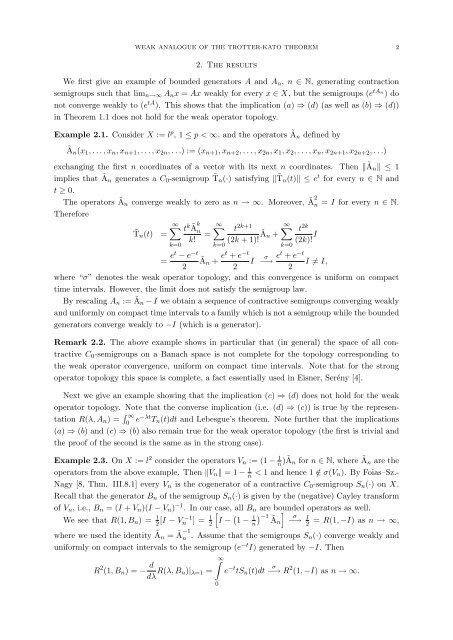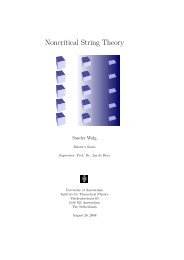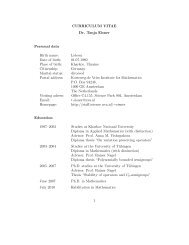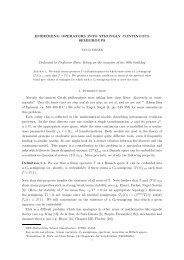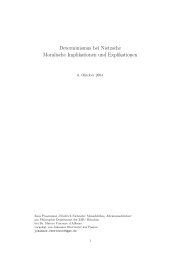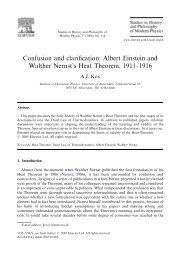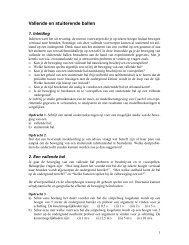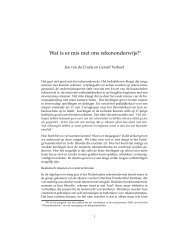ON THE WEAK ANALOGUE OF THE TROTTER-KATO THEOREM 1 ...
ON THE WEAK ANALOGUE OF THE TROTTER-KATO THEOREM 1 ...
ON THE WEAK ANALOGUE OF THE TROTTER-KATO THEOREM 1 ...
Create successful ePaper yourself
Turn your PDF publications into a flip-book with our unique Google optimized e-Paper software.
<strong>WEAK</strong> <strong>ANALOGUE</strong> <strong>OF</strong> <strong>THE</strong> <strong>TROTTER</strong>-<strong>KATO</strong> <strong>THE</strong>OREM 2<br />
2. The results<br />
We first give an example of bounded generators A and A n , n ∈ N, generating contraction<br />
semigroups such that lim n→∞ A n x = Ax weakly for every x ∈ X, but the semigroups (e tAn ) do<br />
not converge weakly to (e tA ). This shows that the implication (a) ⇒ (d) (as well as (b) ⇒ (d))<br />
in Theorem 1.1 does not hold for the weak operator topology.<br />
Example 2.1. Consider X := l p , 1 ≤ p < ∞, and the operators Ãn defined by<br />
à n (x 1 , . . . , x n , x n+1 , . . . , x 2n , . . .) := (x n+1 , x n+2 , . . . , x 2n , x 1 , x 2 , . . . , x n , x 2n+1 , x 2n+2 , . . .)<br />
exchanging the first n coordinates of a vector with its next n coordinates. Then ‖Ãn‖ ≤ 1<br />
implies that Ãn generates a C 0 -semigroup ˜T n (·) satisfying ‖˜T n (t)‖ ≤ e t for every n ∈ N and<br />
t ≥ 0.<br />
The operators Ãn converge weakly to zero as n → ∞. Moreover, Ã2 n = I for every n ∈ N.<br />
Therefore<br />
˜T n (t) =<br />
∞∑<br />
k=0<br />
t k à k n<br />
k!<br />
=<br />
∞∑<br />
k=0<br />
t 2k+1<br />
(2k + 1)!Ãn +<br />
∞∑<br />
k=0<br />
t 2k<br />
(2k)! I<br />
= et − e −t<br />
à n + et + e −t σ<br />
I −→ et + e −t<br />
I ≠ I,<br />
2<br />
2<br />
2<br />
where “σ” denotes the weak operator topology, and this convergence is uniform on compact<br />
time intervals. However, the limit does not satisfy the semigroup law.<br />
By rescaling A n := Ãn − I we obtain a sequence of contractive semigroups converging weakly<br />
and uniformly on compact time intervals to a family which is not a semigroup while the bounded<br />
generators converge weakly to −I (which is a generator).<br />
Remark 2.2. The above example shows in particular that (in general) the space of all contractive<br />
C 0 -semigroups on a Banach space is not complete for the topology corresponding to<br />
the weak operator convergence, uniform on compact time intervals. Note that for the strong<br />
operator topology this space is complete, a fact essentially used in Eisner, Serény [4].<br />
Next we give an example showing that the implication (c) ⇒ (d) does not hold for the weak<br />
operator topology. Note that the converse implication (i.e. (d) ⇒ (c)) is true by the representation<br />
R(λ, A n ) = ∫ ∞<br />
0<br />
e −λt T n (t)dt and Lebesgue’s theorem. Note further that the implications<br />
(a) ⇒ (b) and (c) ⇒ (b) also remain true for the weak operator topology (the first is trivial and<br />
the proof of the second is the same as in the strong case).<br />
Example 2.3. On X := l 2 consider the operators V n := (1 − 1 n )Ãn for n ∈ N, where Ãn are the<br />
operators from the above example. Then ‖V n ‖ = 1 − 1 n < 1 and hence 1 /∈ σ(V n). By Foias–Sz.-<br />
Nagy [8, Thm. III.8.1] every V n is the cogenerator of a contractive C 0 -semigroup S n (·) on X.<br />
Recall that the generator B n of the semigroup S n (·) is given by the (negative) Cayley transform<br />
of V n , i.e., B n = (I + V n )(I − V n ) −1 . In our [ case, all B n are bounded operators as well.<br />
We see that R(1, B n ) = 1 2<br />
[I − V<br />
−1<br />
n ] = 1 2<br />
I − ( 1 − 1 ) ] −1 σ<br />
n<br />
à n −→ I 2<br />
= R(1, −I) as n → ∞,<br />
where we used the identity Ãn = Ã−1 n . Assume that the semigroups S n (·) converge weakly and<br />
uniformly on compact intervals to the semigroup (e −t I) generated by −I. Then<br />
R 2 (1, B n ) = − d<br />
dλ R(λ, B n)| λ=1 =<br />
∫ ∞<br />
0<br />
e −t tS n (t)dt<br />
σ<br />
−→ R 2 (1, −I) as n → ∞.


